Governance and Auditing: Factors, Threats, and Measures Evaluation
VerifiedAdded on 2020/10/22
|9
|2499
|155
Essay
AI Summary
This essay delves into the multifaceted realm of audit quality and its relationship with governance. It begins by defining governance and auditing, setting the stage for an exploration of the factors that influence audit quality, such as internal controls, firm size, auditor reputation, independence, and industry specialization. The essay then identifies various threats to audit quality, including unwillingness to disclose information and lack of auditor independence, along with measures undertaken to mitigate these threats, such as peer reviews, cooperation with audited companies, and professional training. Furthermore, it evaluates recent measures undertaken by stakeholders and regulators like the Financial Reporting Council (FRC) and Recognised Supervisory Bodies (RSBs) to enhance audit quality, focusing on transparency, auditor independence, and professional competence. The essay concludes by underscoring the importance of good governance and effective auditing in maintaining the integrity and reliability of financial information.
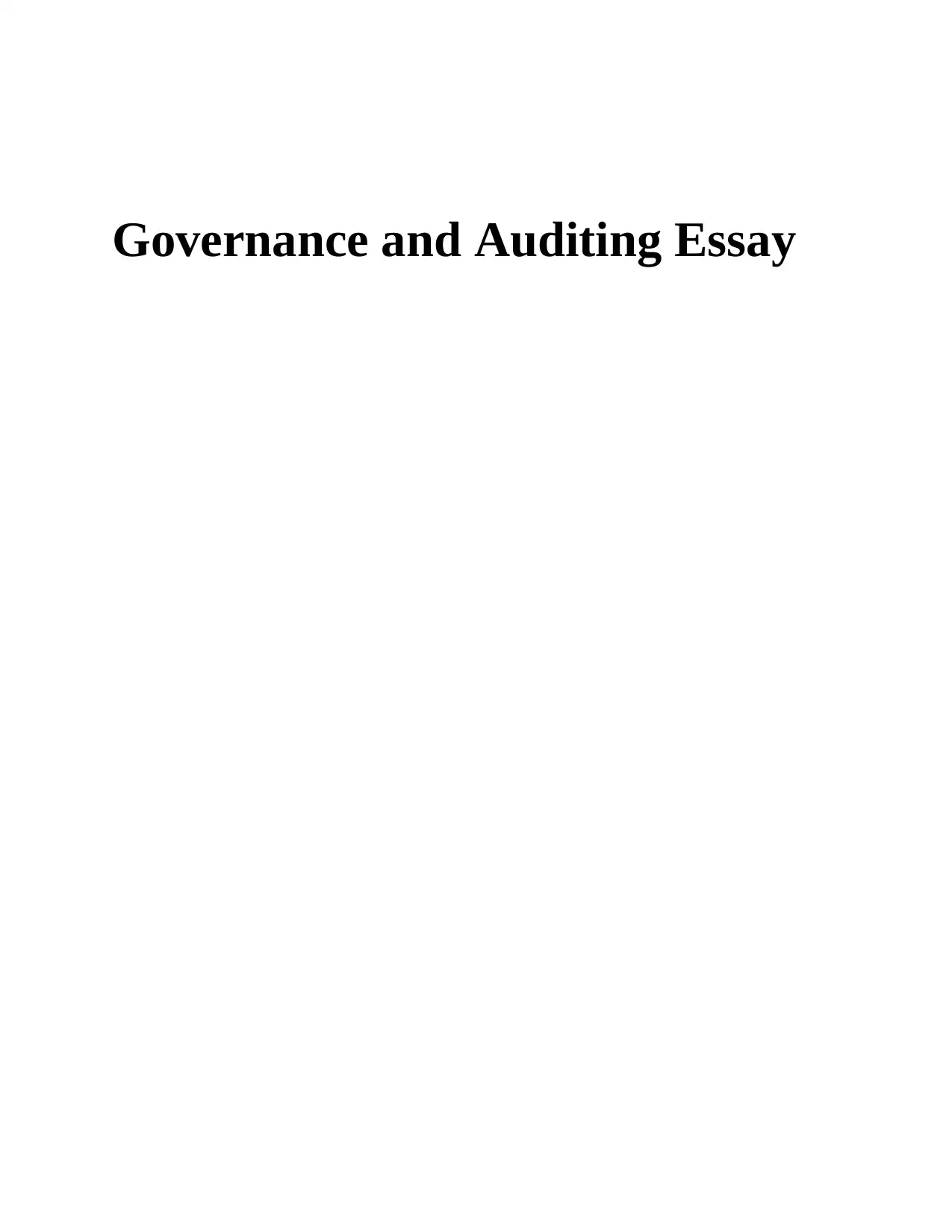
Governance and Auditing Essay
Paraphrase This Document
Need a fresh take? Get an instant paraphrase of this document with our AI Paraphraser
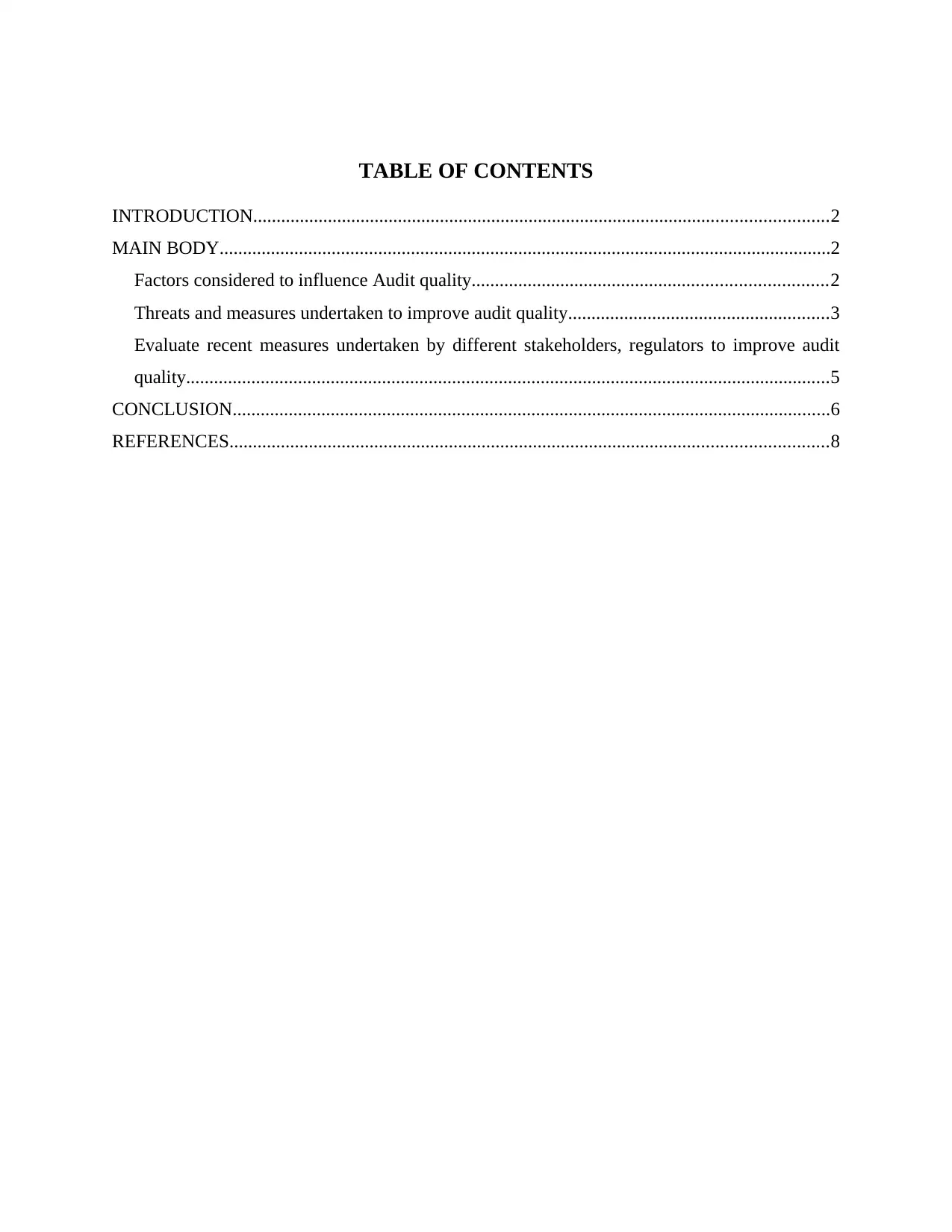
TABLE OF CONTENTS
INTRODUCTION...........................................................................................................................2
MAIN BODY...................................................................................................................................2
Factors considered to influence Audit quality............................................................................2
Threats and measures undertaken to improve audit quality........................................................3
Evaluate recent measures undertaken by different stakeholders, regulators to improve audit
quality..........................................................................................................................................5
CONCLUSION................................................................................................................................6
REFERENCES................................................................................................................................8
INTRODUCTION...........................................................................................................................2
MAIN BODY...................................................................................................................................2
Factors considered to influence Audit quality............................................................................2
Threats and measures undertaken to improve audit quality........................................................3
Evaluate recent measures undertaken by different stakeholders, regulators to improve audit
quality..........................................................................................................................................5
CONCLUSION................................................................................................................................6
REFERENCES................................................................................................................................8
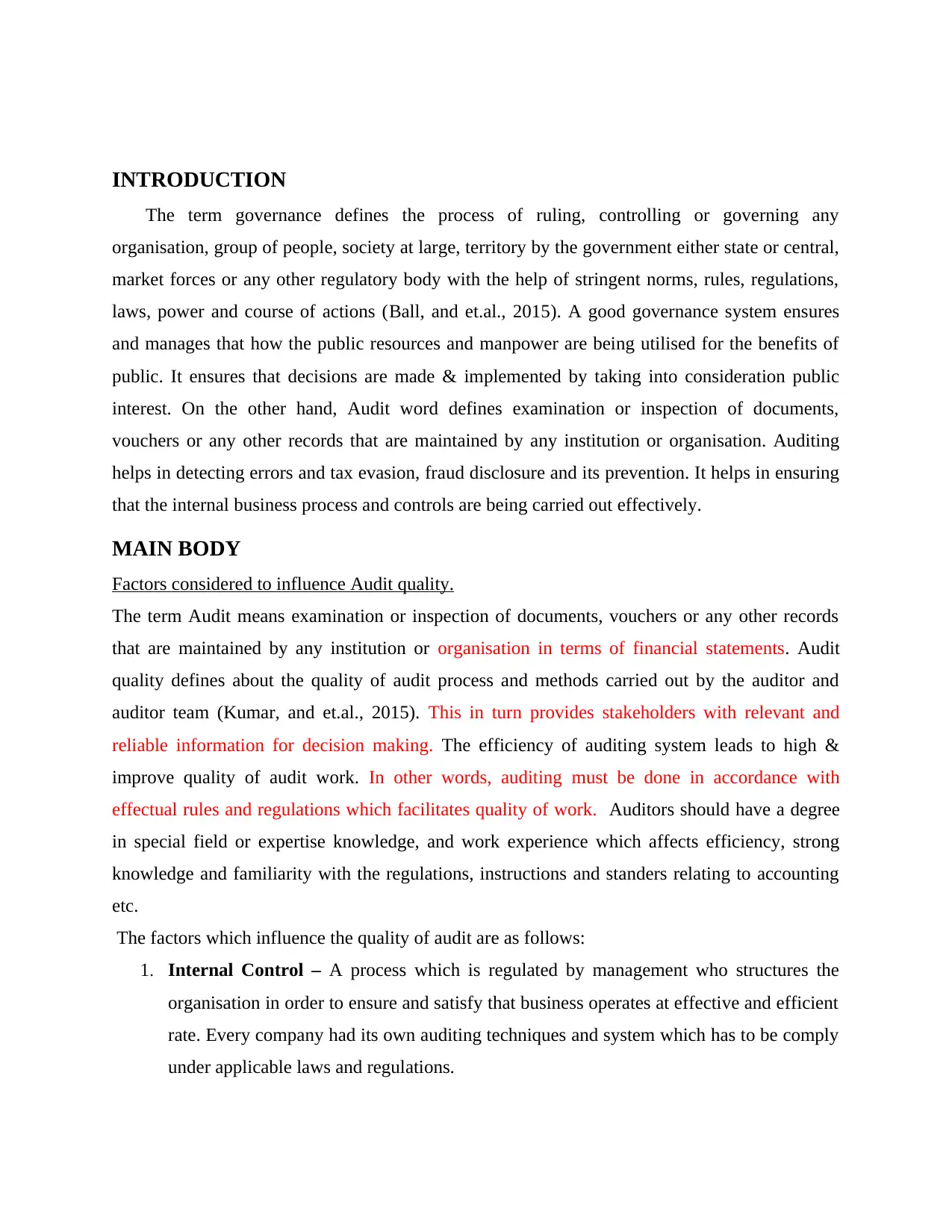
INTRODUCTION
The term governance defines the process of ruling, controlling or governing any
organisation, group of people, society at large, territory by the government either state or central,
market forces or any other regulatory body with the help of stringent norms, rules, regulations,
laws, power and course of actions (Ball, and et.al., 2015). A good governance system ensures
and manages that how the public resources and manpower are being utilised for the benefits of
public. It ensures that decisions are made & implemented by taking into consideration public
interest. On the other hand, Audit word defines examination or inspection of documents,
vouchers or any other records that are maintained by any institution or organisation. Auditing
helps in detecting errors and tax evasion, fraud disclosure and its prevention. It helps in ensuring
that the internal business process and controls are being carried out effectively.
MAIN BODY
Factors considered to influence Audit quality.
The term Audit means examination or inspection of documents, vouchers or any other records
that are maintained by any institution or organisation in terms of financial statements. Audit
quality defines about the quality of audit process and methods carried out by the auditor and
auditor team (Kumar, and et.al., 2015). This in turn provides stakeholders with relevant and
reliable information for decision making. The efficiency of auditing system leads to high &
improve quality of audit work. In other words, auditing must be done in accordance with
effectual rules and regulations which facilitates quality of work. Auditors should have a degree
in special field or expertise knowledge, and work experience which affects efficiency, strong
knowledge and familiarity with the regulations, instructions and standers relating to accounting
etc.
The factors which influence the quality of audit are as follows:
1. Internal Control – A process which is regulated by management who structures the
organisation in order to ensure and satisfy that business operates at effective and efficient
rate. Every company had its own auditing techniques and system which has to be comply
under applicable laws and regulations.
The term governance defines the process of ruling, controlling or governing any
organisation, group of people, society at large, territory by the government either state or central,
market forces or any other regulatory body with the help of stringent norms, rules, regulations,
laws, power and course of actions (Ball, and et.al., 2015). A good governance system ensures
and manages that how the public resources and manpower are being utilised for the benefits of
public. It ensures that decisions are made & implemented by taking into consideration public
interest. On the other hand, Audit word defines examination or inspection of documents,
vouchers or any other records that are maintained by any institution or organisation. Auditing
helps in detecting errors and tax evasion, fraud disclosure and its prevention. It helps in ensuring
that the internal business process and controls are being carried out effectively.
MAIN BODY
Factors considered to influence Audit quality.
The term Audit means examination or inspection of documents, vouchers or any other records
that are maintained by any institution or organisation in terms of financial statements. Audit
quality defines about the quality of audit process and methods carried out by the auditor and
auditor team (Kumar, and et.al., 2015). This in turn provides stakeholders with relevant and
reliable information for decision making. The efficiency of auditing system leads to high &
improve quality of audit work. In other words, auditing must be done in accordance with
effectual rules and regulations which facilitates quality of work. Auditors should have a degree
in special field or expertise knowledge, and work experience which affects efficiency, strong
knowledge and familiarity with the regulations, instructions and standers relating to accounting
etc.
The factors which influence the quality of audit are as follows:
1. Internal Control – A process which is regulated by management who structures the
organisation in order to ensure and satisfy that business operates at effective and efficient
rate. Every company had its own auditing techniques and system which has to be comply
under applicable laws and regulations.
⊘ This is a preview!⊘
Do you want full access?
Subscribe today to unlock all pages.

Trusted by 1+ million students worldwide
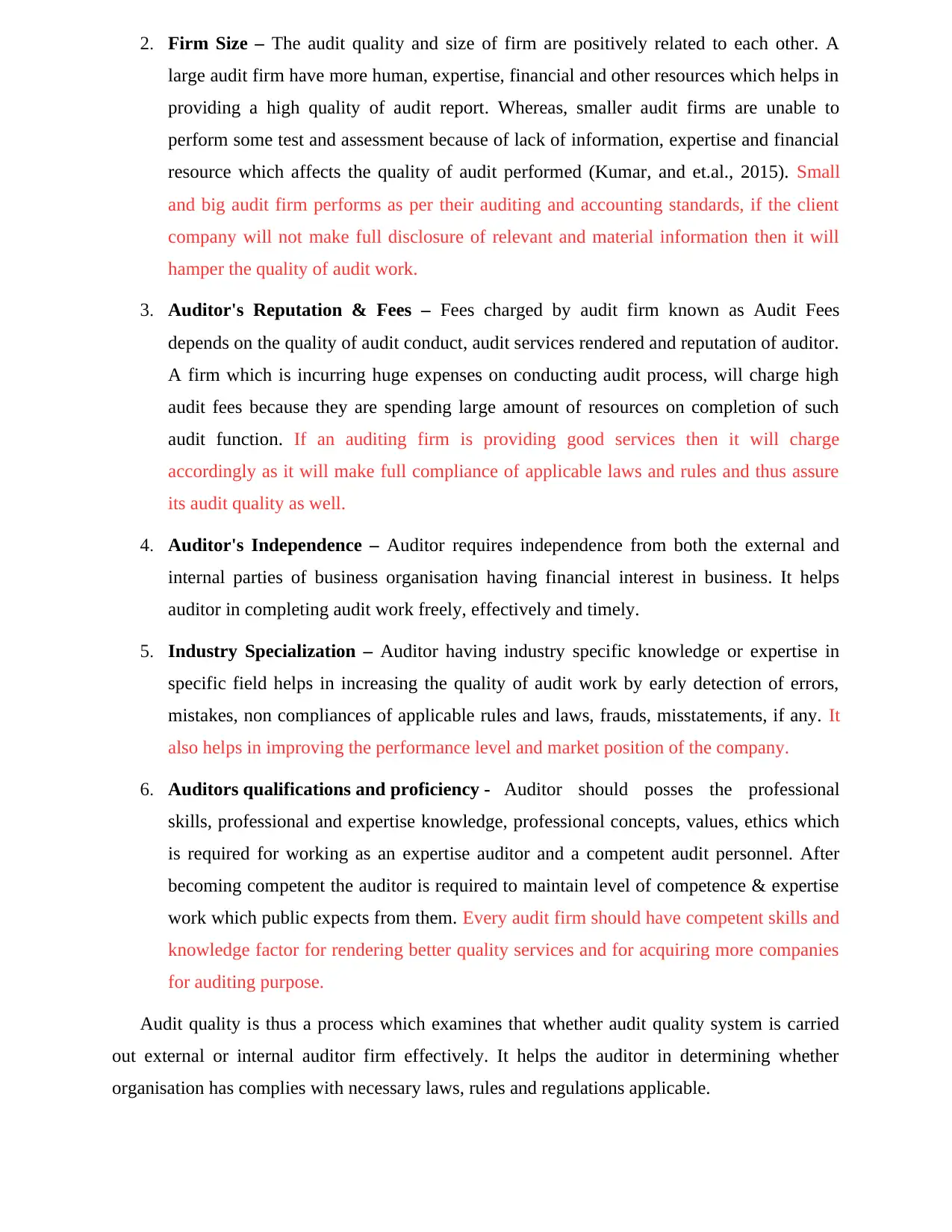
2. Firm Size – The audit quality and size of firm are positively related to each other. A
large audit firm have more human, expertise, financial and other resources which helps in
providing a high quality of audit report. Whereas, smaller audit firms are unable to
perform some test and assessment because of lack of information, expertise and financial
resource which affects the quality of audit performed (Kumar, and et.al., 2015). Small
and big audit firm performs as per their auditing and accounting standards, if the client
company will not make full disclosure of relevant and material information then it will
hamper the quality of audit work.
3. Auditor's Reputation & Fees – Fees charged by audit firm known as Audit Fees
depends on the quality of audit conduct, audit services rendered and reputation of auditor.
A firm which is incurring huge expenses on conducting audit process, will charge high
audit fees because they are spending large amount of resources on completion of such
audit function. If an auditing firm is providing good services then it will charge
accordingly as it will make full compliance of applicable laws and rules and thus assure
its audit quality as well.
4. Auditor's Independence – Auditor requires independence from both the external and
internal parties of business organisation having financial interest in business. It helps
auditor in completing audit work freely, effectively and timely.
5. Industry Specialization – Auditor having industry specific knowledge or expertise in
specific field helps in increasing the quality of audit work by early detection of errors,
mistakes, non compliances of applicable rules and laws, frauds, misstatements, if any. It
also helps in improving the performance level and market position of the company.
6. Auditors qualifications and proficiency - Auditor should posses the professional
skills, professional and expertise knowledge, professional concepts, values, ethics which
is required for working as an expertise auditor and a competent audit personnel. After
becoming competent the auditor is required to maintain level of competence & expertise
work which public expects from them. Every audit firm should have competent skills and
knowledge factor for rendering better quality services and for acquiring more companies
for auditing purpose.
Audit quality is thus a process which examines that whether audit quality system is carried
out external or internal auditor firm effectively. It helps the auditor in determining whether
organisation has complies with necessary laws, rules and regulations applicable.
large audit firm have more human, expertise, financial and other resources which helps in
providing a high quality of audit report. Whereas, smaller audit firms are unable to
perform some test and assessment because of lack of information, expertise and financial
resource which affects the quality of audit performed (Kumar, and et.al., 2015). Small
and big audit firm performs as per their auditing and accounting standards, if the client
company will not make full disclosure of relevant and material information then it will
hamper the quality of audit work.
3. Auditor's Reputation & Fees – Fees charged by audit firm known as Audit Fees
depends on the quality of audit conduct, audit services rendered and reputation of auditor.
A firm which is incurring huge expenses on conducting audit process, will charge high
audit fees because they are spending large amount of resources on completion of such
audit function. If an auditing firm is providing good services then it will charge
accordingly as it will make full compliance of applicable laws and rules and thus assure
its audit quality as well.
4. Auditor's Independence – Auditor requires independence from both the external and
internal parties of business organisation having financial interest in business. It helps
auditor in completing audit work freely, effectively and timely.
5. Industry Specialization – Auditor having industry specific knowledge or expertise in
specific field helps in increasing the quality of audit work by early detection of errors,
mistakes, non compliances of applicable rules and laws, frauds, misstatements, if any. It
also helps in improving the performance level and market position of the company.
6. Auditors qualifications and proficiency - Auditor should posses the professional
skills, professional and expertise knowledge, professional concepts, values, ethics which
is required for working as an expertise auditor and a competent audit personnel. After
becoming competent the auditor is required to maintain level of competence & expertise
work which public expects from them. Every audit firm should have competent skills and
knowledge factor for rendering better quality services and for acquiring more companies
for auditing purpose.
Audit quality is thus a process which examines that whether audit quality system is carried
out external or internal auditor firm effectively. It helps the auditor in determining whether
organisation has complies with necessary laws, rules and regulations applicable.
Paraphrase This Document
Need a fresh take? Get an instant paraphrase of this document with our AI Paraphraser
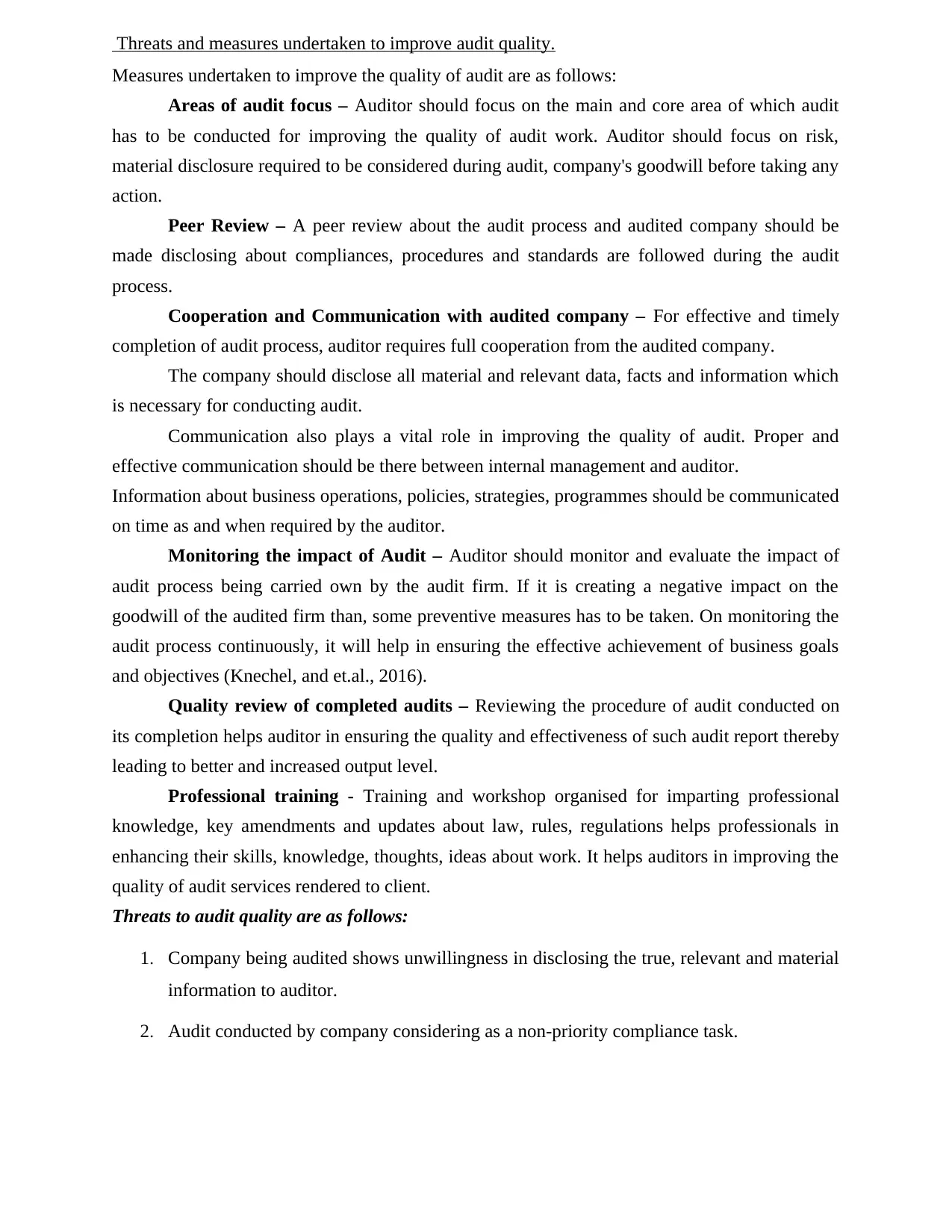
Threats and measures undertaken to improve audit quality.
Measures undertaken to improve the quality of audit are as follows:
Areas of audit focus – Auditor should focus on the main and core area of which audit
has to be conducted for improving the quality of audit work. Auditor should focus on risk,
material disclosure required to be considered during audit, company's goodwill before taking any
action.
Peer Review – A peer review about the audit process and audited company should be
made disclosing about compliances, procedures and standards are followed during the audit
process.
Cooperation and Communication with audited company – For effective and timely
completion of audit process, auditor requires full cooperation from the audited company.
The company should disclose all material and relevant data, facts and information which
is necessary for conducting audit.
Communication also plays a vital role in improving the quality of audit. Proper and
effective communication should be there between internal management and auditor.
Information about business operations, policies, strategies, programmes should be communicated
on time as and when required by the auditor.
Monitoring the impact of Audit – Auditor should monitor and evaluate the impact of
audit process being carried own by the audit firm. If it is creating a negative impact on the
goodwill of the audited firm than, some preventive measures has to be taken. On monitoring the
audit process continuously, it will help in ensuring the effective achievement of business goals
and objectives (Knechel, and et.al., 2016).
Quality review of completed audits – Reviewing the procedure of audit conducted on
its completion helps auditor in ensuring the quality and effectiveness of such audit report thereby
leading to better and increased output level.
Professional training - Training and workshop organised for imparting professional
knowledge, key amendments and updates about law, rules, regulations helps professionals in
enhancing their skills, knowledge, thoughts, ideas about work. It helps auditors in improving the
quality of audit services rendered to client.
Threats to audit quality are as follows:
1. Company being audited shows unwillingness in disclosing the true, relevant and material
information to auditor.
2. Audit conducted by company considering as a non-priority compliance task.
Measures undertaken to improve the quality of audit are as follows:
Areas of audit focus – Auditor should focus on the main and core area of which audit
has to be conducted for improving the quality of audit work. Auditor should focus on risk,
material disclosure required to be considered during audit, company's goodwill before taking any
action.
Peer Review – A peer review about the audit process and audited company should be
made disclosing about compliances, procedures and standards are followed during the audit
process.
Cooperation and Communication with audited company – For effective and timely
completion of audit process, auditor requires full cooperation from the audited company.
The company should disclose all material and relevant data, facts and information which
is necessary for conducting audit.
Communication also plays a vital role in improving the quality of audit. Proper and
effective communication should be there between internal management and auditor.
Information about business operations, policies, strategies, programmes should be communicated
on time as and when required by the auditor.
Monitoring the impact of Audit – Auditor should monitor and evaluate the impact of
audit process being carried own by the audit firm. If it is creating a negative impact on the
goodwill of the audited firm than, some preventive measures has to be taken. On monitoring the
audit process continuously, it will help in ensuring the effective achievement of business goals
and objectives (Knechel, and et.al., 2016).
Quality review of completed audits – Reviewing the procedure of audit conducted on
its completion helps auditor in ensuring the quality and effectiveness of such audit report thereby
leading to better and increased output level.
Professional training - Training and workshop organised for imparting professional
knowledge, key amendments and updates about law, rules, regulations helps professionals in
enhancing their skills, knowledge, thoughts, ideas about work. It helps auditors in improving the
quality of audit services rendered to client.
Threats to audit quality are as follows:
1. Company being audited shows unwillingness in disclosing the true, relevant and material
information to auditor.
2. Audit conducted by company considering as a non-priority compliance task.
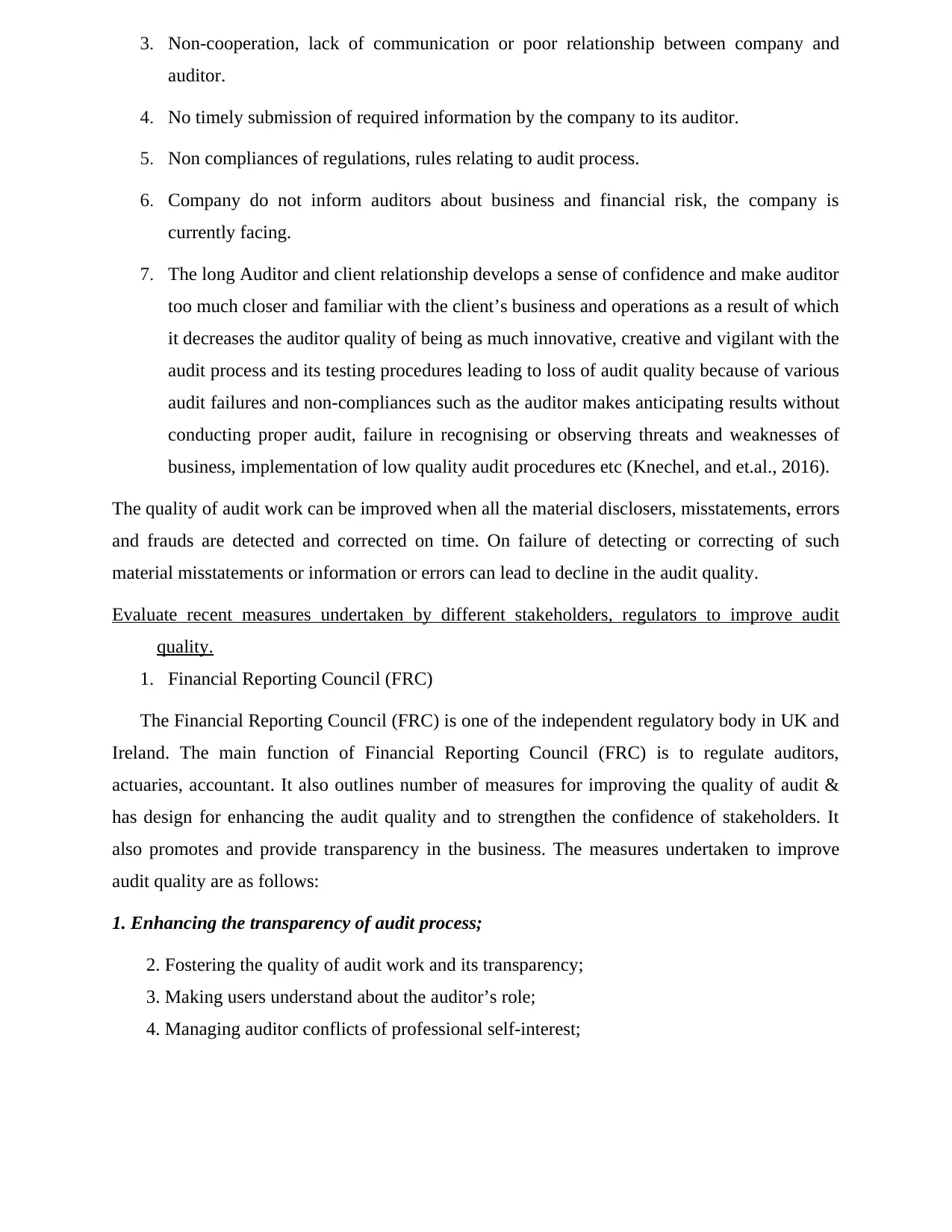
3. Non-cooperation, lack of communication or poor relationship between company and
auditor.
4. No timely submission of required information by the company to its auditor.
5. Non compliances of regulations, rules relating to audit process.
6. Company do not inform auditors about business and financial risk, the company is
currently facing.
7. The long Auditor and client relationship develops a sense of confidence and make auditor
too much closer and familiar with the client’s business and operations as a result of which
it decreases the auditor quality of being as much innovative, creative and vigilant with the
audit process and its testing procedures leading to loss of audit quality because of various
audit failures and non-compliances such as the auditor makes anticipating results without
conducting proper audit, failure in recognising or observing threats and weaknesses of
business, implementation of low quality audit procedures etc (Knechel, and et.al., 2016).
The quality of audit work can be improved when all the material disclosers, misstatements, errors
and frauds are detected and corrected on time. On failure of detecting or correcting of such
material misstatements or information or errors can lead to decline in the audit quality.
Evaluate recent measures undertaken by different stakeholders, regulators to improve audit
quality.
1. Financial Reporting Council (FRC)
The Financial Reporting Council (FRC) is one of the independent regulatory body in UK and
Ireland. The main function of Financial Reporting Council (FRC) is to regulate auditors,
actuaries, accountant. It also outlines number of measures for improving the quality of audit &
has design for enhancing the audit quality and to strengthen the confidence of stakeholders. It
also promotes and provide transparency in the business. The measures undertaken to improve
audit quality are as follows:
1. Enhancing the transparency of audit process;
2. Fostering the quality of audit work and its transparency;
3. Making users understand about the auditor’s role;
4. Managing auditor conflicts of professional self-interest;
auditor.
4. No timely submission of required information by the company to its auditor.
5. Non compliances of regulations, rules relating to audit process.
6. Company do not inform auditors about business and financial risk, the company is
currently facing.
7. The long Auditor and client relationship develops a sense of confidence and make auditor
too much closer and familiar with the client’s business and operations as a result of which
it decreases the auditor quality of being as much innovative, creative and vigilant with the
audit process and its testing procedures leading to loss of audit quality because of various
audit failures and non-compliances such as the auditor makes anticipating results without
conducting proper audit, failure in recognising or observing threats and weaknesses of
business, implementation of low quality audit procedures etc (Knechel, and et.al., 2016).
The quality of audit work can be improved when all the material disclosers, misstatements, errors
and frauds are detected and corrected on time. On failure of detecting or correcting of such
material misstatements or information or errors can lead to decline in the audit quality.
Evaluate recent measures undertaken by different stakeholders, regulators to improve audit
quality.
1. Financial Reporting Council (FRC)
The Financial Reporting Council (FRC) is one of the independent regulatory body in UK and
Ireland. The main function of Financial Reporting Council (FRC) is to regulate auditors,
actuaries, accountant. It also outlines number of measures for improving the quality of audit &
has design for enhancing the audit quality and to strengthen the confidence of stakeholders. It
also promotes and provide transparency in the business. The measures undertaken to improve
audit quality are as follows:
1. Enhancing the transparency of audit process;
2. Fostering the quality of audit work and its transparency;
3. Making users understand about the auditor’s role;
4. Managing auditor conflicts of professional self-interest;
⊘ This is a preview!⊘
Do you want full access?
Subscribe today to unlock all pages.

Trusted by 1+ million students worldwide
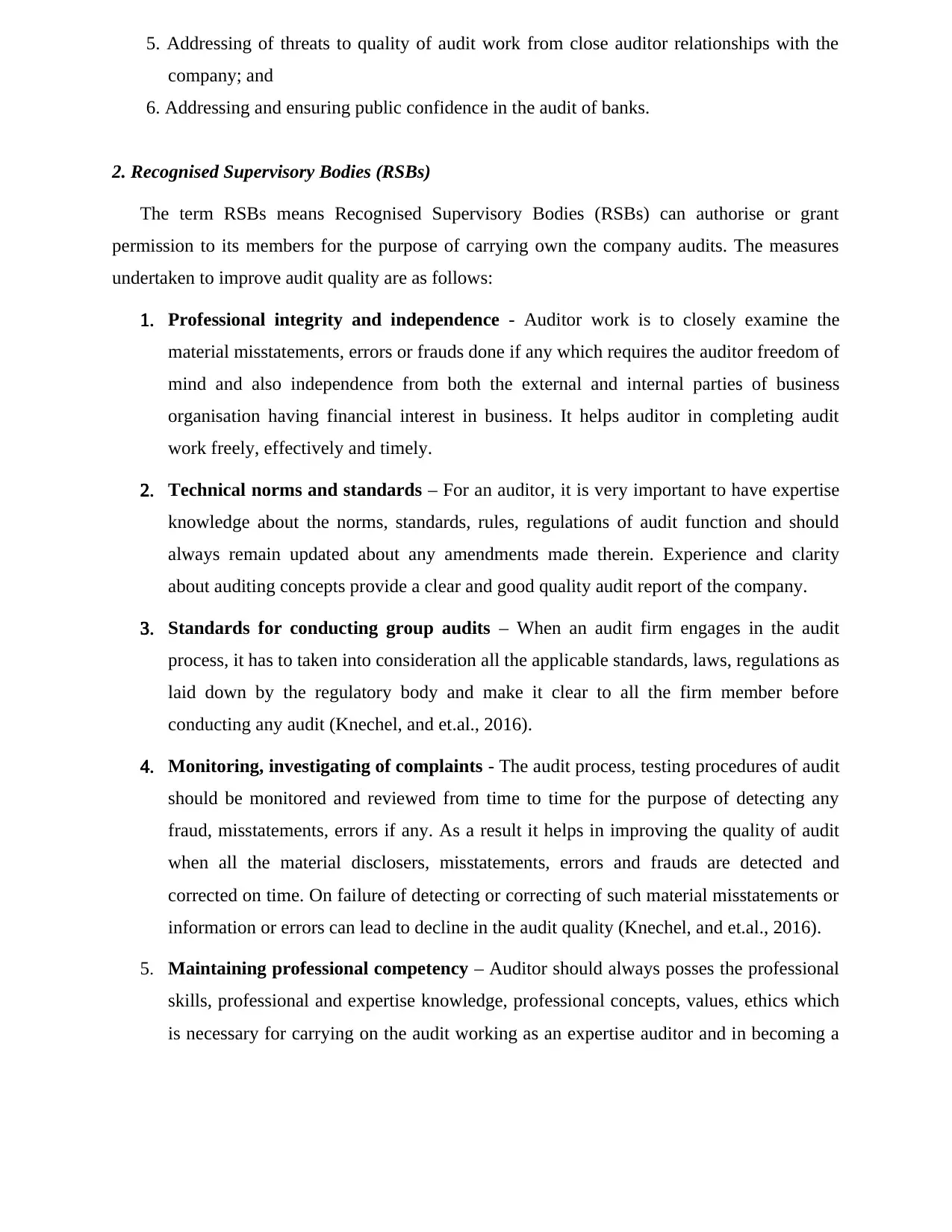
5. Addressing of threats to quality of audit work from close auditor relationships with the
company; and
6. Addressing and ensuring public confidence in the audit of banks.
2. Recognised Supervisory Bodies (RSBs)
The term RSBs means Recognised Supervisory Bodies (RSBs) can authorise or grant
permission to its members for the purpose of carrying own the company audits. The measures
undertaken to improve audit quality are as follows:
1. Professional integrity and independence - Auditor work is to closely examine the
material misstatements, errors or frauds done if any which requires the auditor freedom of
mind and also independence from both the external and internal parties of business
organisation having financial interest in business. It helps auditor in completing audit
work freely, effectively and timely.
2. Technical norms and standards – For an auditor, it is very important to have expertise
knowledge about the norms, standards, rules, regulations of audit function and should
always remain updated about any amendments made therein. Experience and clarity
about auditing concepts provide a clear and good quality audit report of the company.
3. Standards for conducting group audits – When an audit firm engages in the audit
process, it has to taken into consideration all the applicable standards, laws, regulations as
laid down by the regulatory body and make it clear to all the firm member before
conducting any audit (Knechel, and et.al., 2016).
4. Monitoring, investigating of complaints - The audit process, testing procedures of audit
should be monitored and reviewed from time to time for the purpose of detecting any
fraud, misstatements, errors if any. As a result it helps in improving the quality of audit
when all the material disclosers, misstatements, errors and frauds are detected and
corrected on time. On failure of detecting or correcting of such material misstatements or
information or errors can lead to decline in the audit quality (Knechel, and et.al., 2016).
5. Maintaining professional competency – Auditor should always posses the professional
skills, professional and expertise knowledge, professional concepts, values, ethics which
is necessary for carrying on the audit working as an expertise auditor and in becoming a
company; and
6. Addressing and ensuring public confidence in the audit of banks.
2. Recognised Supervisory Bodies (RSBs)
The term RSBs means Recognised Supervisory Bodies (RSBs) can authorise or grant
permission to its members for the purpose of carrying own the company audits. The measures
undertaken to improve audit quality are as follows:
1. Professional integrity and independence - Auditor work is to closely examine the
material misstatements, errors or frauds done if any which requires the auditor freedom of
mind and also independence from both the external and internal parties of business
organisation having financial interest in business. It helps auditor in completing audit
work freely, effectively and timely.
2. Technical norms and standards – For an auditor, it is very important to have expertise
knowledge about the norms, standards, rules, regulations of audit function and should
always remain updated about any amendments made therein. Experience and clarity
about auditing concepts provide a clear and good quality audit report of the company.
3. Standards for conducting group audits – When an audit firm engages in the audit
process, it has to taken into consideration all the applicable standards, laws, regulations as
laid down by the regulatory body and make it clear to all the firm member before
conducting any audit (Knechel, and et.al., 2016).
4. Monitoring, investigating of complaints - The audit process, testing procedures of audit
should be monitored and reviewed from time to time for the purpose of detecting any
fraud, misstatements, errors if any. As a result it helps in improving the quality of audit
when all the material disclosers, misstatements, errors and frauds are detected and
corrected on time. On failure of detecting or correcting of such material misstatements or
information or errors can lead to decline in the audit quality (Knechel, and et.al., 2016).
5. Maintaining professional competency – Auditor should always posses the professional
skills, professional and expertise knowledge, professional concepts, values, ethics which
is necessary for carrying on the audit working as an expertise auditor and in becoming a
Paraphrase This Document
Need a fresh take? Get an instant paraphrase of this document with our AI Paraphraser
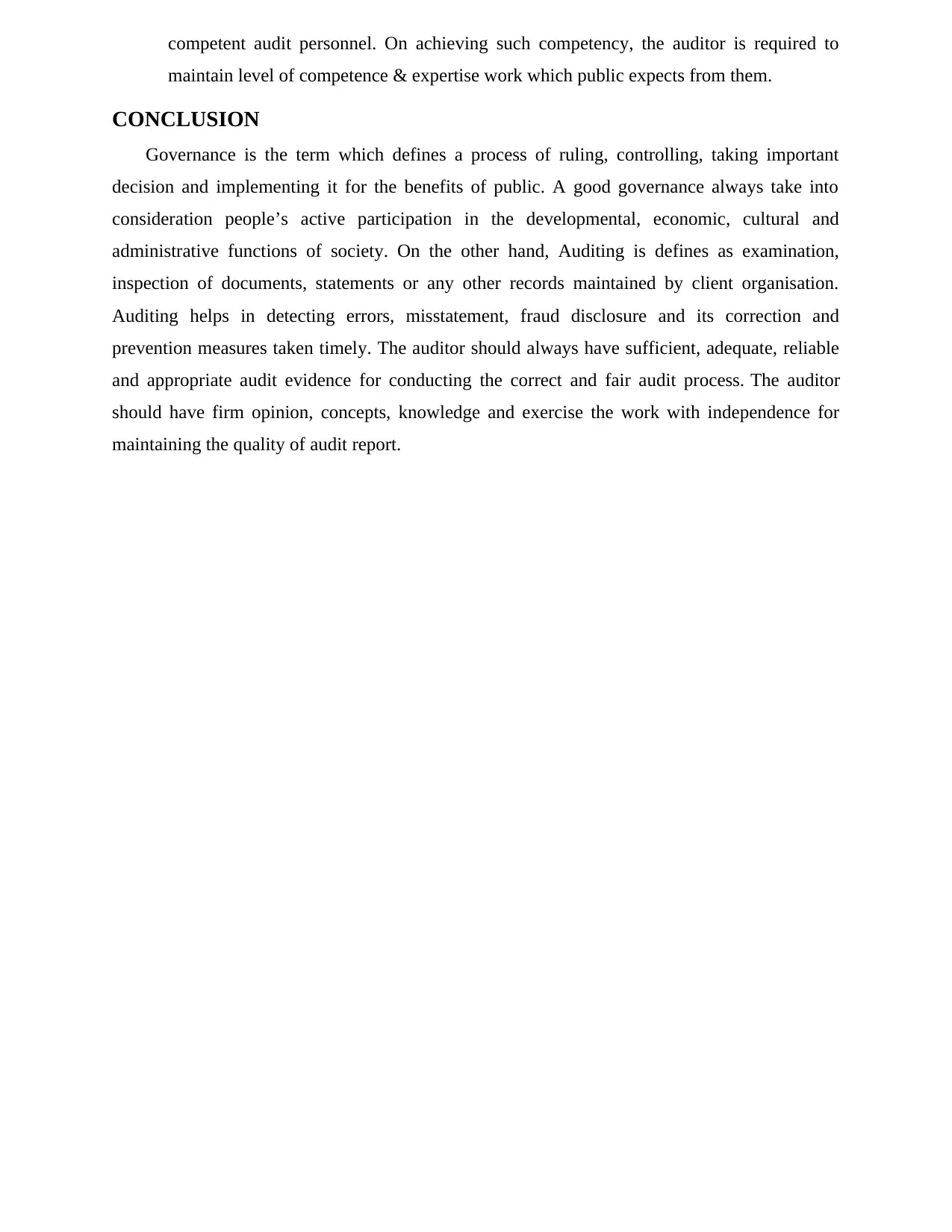
competent audit personnel. On achieving such competency, the auditor is required to
maintain level of competence & expertise work which public expects from them.
CONCLUSION
Governance is the term which defines a process of ruling, controlling, taking important
decision and implementing it for the benefits of public. A good governance always take into
consideration people’s active participation in the developmental, economic, cultural and
administrative functions of society. On the other hand, Auditing is defines as examination,
inspection of documents, statements or any other records maintained by client organisation.
Auditing helps in detecting errors, misstatement, fraud disclosure and its correction and
prevention measures taken timely. The auditor should always have sufficient, adequate, reliable
and appropriate audit evidence for conducting the correct and fair audit process. The auditor
should have firm opinion, concepts, knowledge and exercise the work with independence for
maintaining the quality of audit report.
maintain level of competence & expertise work which public expects from them.
CONCLUSION
Governance is the term which defines a process of ruling, controlling, taking important
decision and implementing it for the benefits of public. A good governance always take into
consideration people’s active participation in the developmental, economic, cultural and
administrative functions of society. On the other hand, Auditing is defines as examination,
inspection of documents, statements or any other records maintained by client organisation.
Auditing helps in detecting errors, misstatement, fraud disclosure and its correction and
prevention measures taken timely. The auditor should always have sufficient, adequate, reliable
and appropriate audit evidence for conducting the correct and fair audit process. The auditor
should have firm opinion, concepts, knowledge and exercise the work with independence for
maintaining the quality of audit report.
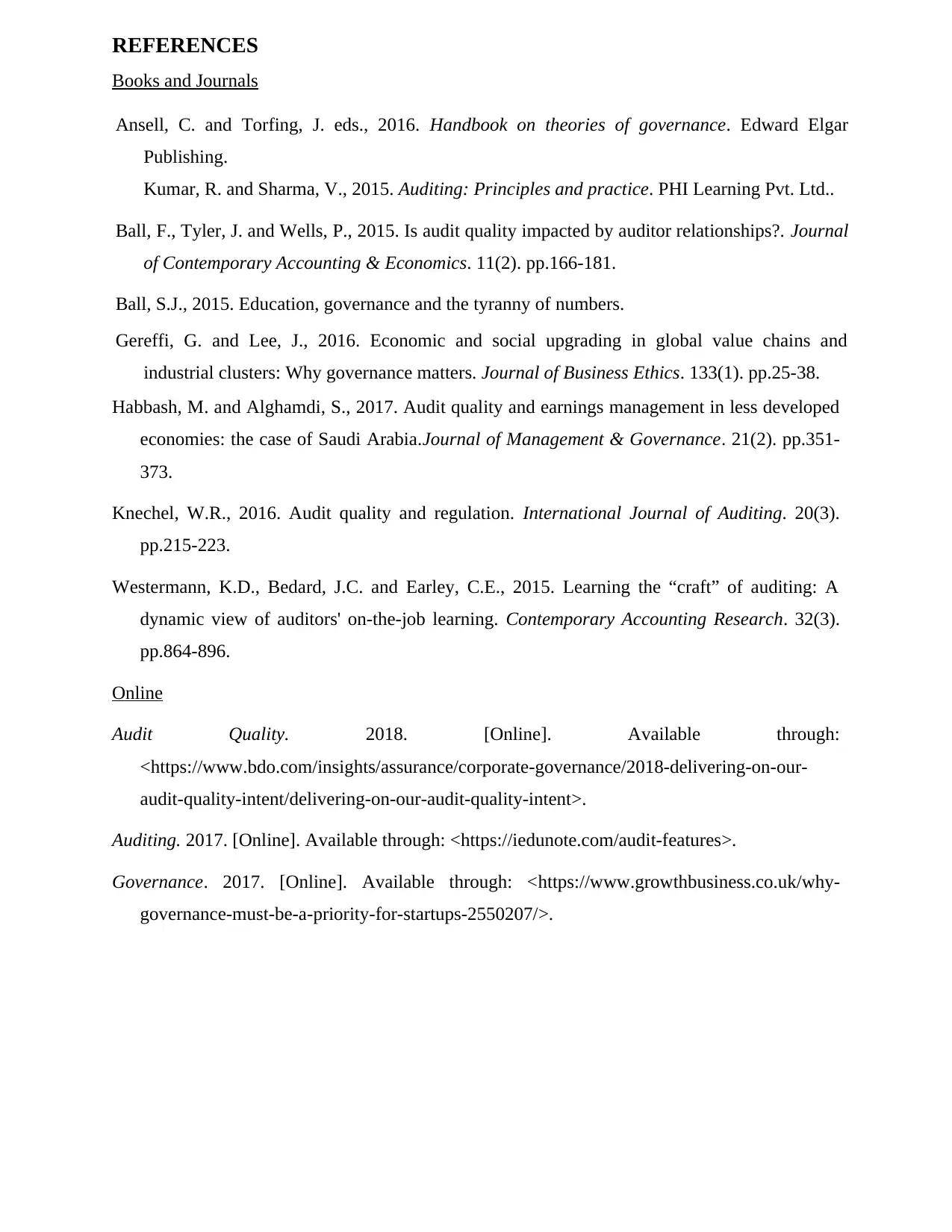
REFERENCES
Books and Journals
Ansell, C. and Torfing, J. eds., 2016. Handbook on theories of governance. Edward Elgar
Publishing.
Kumar, R. and Sharma, V., 2015. Auditing: Principles and practice. PHI Learning Pvt. Ltd..
Ball, F., Tyler, J. and Wells, P., 2015. Is audit quality impacted by auditor relationships?. Journal
of Contemporary Accounting & Economics. 11(2). pp.166-181.
Ball, S.J., 2015. Education, governance and the tyranny of numbers.
Gereffi, G. and Lee, J., 2016. Economic and social upgrading in global value chains and
industrial clusters: Why governance matters. Journal of Business Ethics. 133(1). pp.25-38.
Habbash, M. and Alghamdi, S., 2017. Audit quality and earnings management in less developed
economies: the case of Saudi Arabia.Journal of Management & Governance. 21(2). pp.351-
373.
Knechel, W.R., 2016. Audit quality and regulation. International Journal of Auditing. 20(3).
pp.215-223.
Westermann, K.D., Bedard, J.C. and Earley, C.E., 2015. Learning the “craft” of auditing: A
dynamic view of auditors' on‐the‐job learning. Contemporary Accounting Research. 32(3).
pp.864-896.
Online
Audit Quality. 2018. [Online]. Available through:
<https://www.bdo.com/insights/assurance/corporate-governance/2018-delivering-on-our-
audit-quality-intent/delivering-on-our-audit-quality-intent>.
Auditing. 2017. [Online]. Available through: <https://iedunote.com/audit-features>.
Governance. 2017. [Online]. Available through: <https://www.growthbusiness.co.uk/why-
governance-must-be-a-priority-for-startups-2550207/>.
Books and Journals
Ansell, C. and Torfing, J. eds., 2016. Handbook on theories of governance. Edward Elgar
Publishing.
Kumar, R. and Sharma, V., 2015. Auditing: Principles and practice. PHI Learning Pvt. Ltd..
Ball, F., Tyler, J. and Wells, P., 2015. Is audit quality impacted by auditor relationships?. Journal
of Contemporary Accounting & Economics. 11(2). pp.166-181.
Ball, S.J., 2015. Education, governance and the tyranny of numbers.
Gereffi, G. and Lee, J., 2016. Economic and social upgrading in global value chains and
industrial clusters: Why governance matters. Journal of Business Ethics. 133(1). pp.25-38.
Habbash, M. and Alghamdi, S., 2017. Audit quality and earnings management in less developed
economies: the case of Saudi Arabia.Journal of Management & Governance. 21(2). pp.351-
373.
Knechel, W.R., 2016. Audit quality and regulation. International Journal of Auditing. 20(3).
pp.215-223.
Westermann, K.D., Bedard, J.C. and Earley, C.E., 2015. Learning the “craft” of auditing: A
dynamic view of auditors' on‐the‐job learning. Contemporary Accounting Research. 32(3).
pp.864-896.
Online
Audit Quality. 2018. [Online]. Available through:
<https://www.bdo.com/insights/assurance/corporate-governance/2018-delivering-on-our-
audit-quality-intent/delivering-on-our-audit-quality-intent>.
Auditing. 2017. [Online]. Available through: <https://iedunote.com/audit-features>.
Governance. 2017. [Online]. Available through: <https://www.growthbusiness.co.uk/why-
governance-must-be-a-priority-for-startups-2550207/>.
⊘ This is a preview!⊘
Do you want full access?
Subscribe today to unlock all pages.

Trusted by 1+ million students worldwide
1 out of 9
Related Documents
Your All-in-One AI-Powered Toolkit for Academic Success.
+13062052269
info@desklib.com
Available 24*7 on WhatsApp / Email
![[object Object]](/_next/static/media/star-bottom.7253800d.svg)
Unlock your academic potential
Copyright © 2020–2025 A2Z Services. All Rights Reserved. Developed and managed by ZUCOL.





